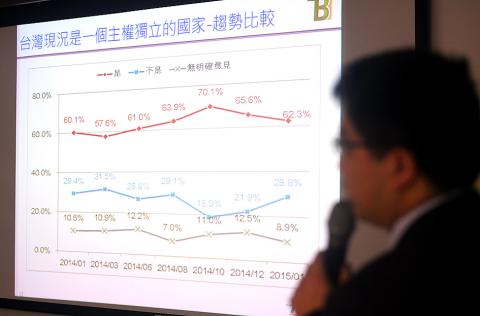A poll conducted by the Taiwan Braintrust shows that nearly 90 percent of the population would identify themselves as “Taiwanese” rather than “Chinese” if they were to choose between the two — and the percentage is even higher among those aged from 20 to 40.
With 1,079 valid samples from 20 cities and counties, the results show that if given the option of being “Taiwanese” or “Chinese,” 89.5 percent of respondents said they would identify themselves as Taiwanese, while just 6 percent said they consider themselves Chinese.
Notably, the percentage of people considering themselves Taiwanese rather than Chinese was larger for younger generations.

Photo: Liao Chen-huei, Taipei Times
Among those aged 70 or older, 76.2 percent said they consider themselves Taiwanese rather than Chinese, while 8.8 percent said they think of themselves as Chinese.
However, for people between 30 and 39 years of age, 93 percent identified themselves as Taiwanese, while 3.2 percent said they are Chinese, and for people from 20 to 29 years old, 92.5 percent identify themselves as Taiwanese, while just 2.4 percent said they are Chinese.
As for the nation’s future, 31.2 percent of respondents said they support independence for Taiwan, while 56.2 percent would prefer to maintain the “status quo” and 7.9 percent support unification with China.
However, when given “independence” and “unification” as the only options, 68.9 percent said they would support independence, while 17.1 percent would support unification with China.
Support for independence is also higher among younger generations, with 79.1 percent of people from 20 to 29 years of age supporting independence, while 12.7 percent support unification with China.
The poll also asked respondents about their impressions of domestic political parties and leaders.
Among the Democratic Progressive Party (DPP), the Chinese Nationalist Party (KMT), the Taiwan Solidarity Union and the People First Party, 33.9 percent of respondents said they prefer the DPP, while 20.5 percent said they support the KMT.
As for the parties’ leaders, 65 percent of respondents said they are satisfied with DPP Chairperson Tsai Ing-wen’s (蔡英文) performance, while 20.8 percent said they are not satisfied with her performance.
KMT Chairman and New Taipei City Mayor Eric Chu’s (朱立倫) support was a little behind, with 46.7 percent saying they are satisfied with his performance, while 27.1 percent are not.
At a press conference to release the results, former presidential adviser Koo Kwang-ming (辜寬敏) criticized Tsai, saying she is unable to solve most of the nation’s problems, including issues of cross-strait relations, while Tainan Mayor William Lai (賴清德) could work things out.
“Our objective is not to get someone elected president; we need a president who can lead Taiwan and solve all the problems,” he said.

DEFENSE: The National Security Bureau promised to expand communication and intelligence cooperation with global partners and enhance its strategic analytical skills China has not only increased military exercises and “gray zone” tactics against Taiwan this year, but also continues to recruit military personnel for espionage, the National Security Bureau (NSB) said yesterday in a report to the Legislative Yuan. The bureau submitted the report ahead of NSB Director-General Tsai Ming-yen’s (蔡明彥) appearance before the Foreign and National Defense Committee today. Last year, the Chinese People’s Liberation Army (PLA) conducted “Joint Sword-2024A and B” military exercises targeting Taiwan and carried out 40 combat readiness patrols, the bureau said. In addition, Chinese military aircraft entered Taiwan’s airspace 3,070 times last year, up about

A magnitude 4.3 earthquake struck eastern Taiwan's Hualien County at 8:31am today, according to the Central Weather Administration (CWA). The epicenter of the temblor was located in Hualien County, about 70.3 kilometers south southwest of Hualien County Hall, at a depth of 23.2km, according to the administration. There were no immediate reports of damage resulting from the quake. The earthquake's intensity, which gauges the actual effect of a temblor, was highest in Taitung County, where it measured 3 on Taiwan's 7-tier intensity scale. The quake also measured an intensity of 2 in Hualien and Nantou counties, the CWA said.

The Overseas Community Affairs Council (OCAC) yesterday announced a fundraising campaign to support survivors of the magnitude 7.7 earthquake that struck Myanmar on March 28, with two prayer events scheduled in Taipei and Taichung later this week. “While initial rescue operations have concluded [in Myanmar], many survivors are now facing increasingly difficult living conditions,” OCAC Minister Hsu Chia-ching (徐佳青) told a news conference in Taipei. The fundraising campaign, which runs through May 31, is focused on supporting the reconstruction of damaged overseas compatriot schools, assisting students from Myanmar in Taiwan, and providing essential items, such as drinking water, food and medical supplies,

New Party Deputy Secretary-General You Chih-pin (游智彬) this morning went to the National Immigration Agency (NIA) to “turn himself in” after being notified that he had failed to provide proof of having renounced his Chinese household registration. He was one of more than 10,000 naturalized Taiwanese citizens from China who were informed by the NIA that their Taiwanese citizenship might be revoked if they fail to provide the proof in three months, people familiar with the matter said. You said he has proof that he had renounced his Chinese household registration and demanded the NIA provide proof that he still had Chinese